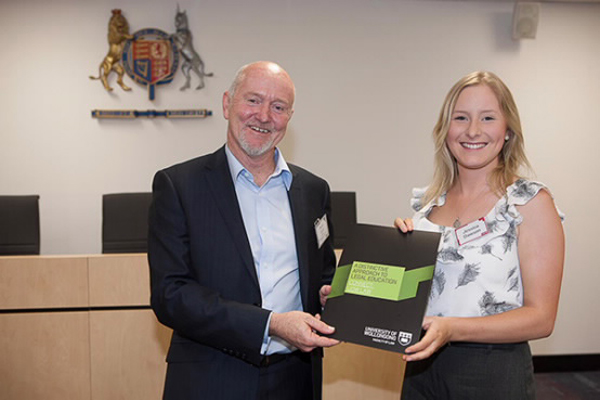May 8, 2014
UOW careers development expert appointed President of Career Industry Council of Australia
As the Director of Graduate Career Development and Employability at the UOW, Martin Smith is dedicated to helping students increase their employment potential. Recently, though, he took a major step forward himself professionally - being appointed president of Australia’s peak industry body, the Career Industry Council of Australia (CICA).
Mr Smith has been involved in the industry for 25 years and two thirds of that time has been with UOW. He has held national leadership roles within professional bodies such as the National Association of Graduate Careers Advisory Services (Past President) and Graduate Careers Australia (Director).
In October 2012 he assumed the role of Vice President of CICA. Accepting the role of President of the organisation in 2014 for the predetermined two-year-period is an apt next step.
Q: What advice applies to everyone, regardless of what stage of their career they are at?
Have a good foundation of knowledge and understanding about yourself – your abilities, preferences, values, drivers and intrinsic rewards you seek, passions. If you know this about yourself, you can make informed and confident decisions to make the most of opportunities and when you have to make important career decisions.
When you’re applying for a position or want to make the most of an opportunity, you must know as much as possible about your target before you approach them. Get to know their products, services, clients, competitors, culture, structure and the industry. Only then can you show your target how you can add value and be a part of a solution with confidence.
Q: What is the typical career path of a young professional today and how does it differ to 20 years ago?
The danger here is to generalise, but it is fair to say that for many, the concept of a ‘job for life’ has disappeared and been replaced with many short-term contracts and chunks of work. The career path is no longer rigid and brightly lit. Instead, you have to take control and make things happen.
Q: Do traditional job hunting strategies still have a place in today’s digitally connected world?
It will never be an ‘either this or that’ approach, rather it is better to be using all formats, channels and networks. With that said, there are some terrific new social media tools out there. LinkedIn is a good example and is particularly helpful for doing research.
A UOW student or graduate, for example, can use LinkedIn to identify UOW alumni who graduated within the past few years within a particular discipline. From there, they could gain a sense of where people are at in their career and even make contact with them with the view of potentially gaining advice and information about job search strategies and opportunities. It is amazing to have this quality of information available via just some careful searches.
Q: You are heavily involved in the organisation of the 2014 NAGCAS Conference that will take place at UOW later this year. What is the objective of this event?
We will be creating an event where those involved in the career development and recruitment of graduates can share the latest innovations and developments in research and practice. Keynote speakers and panels will focus on improving the quality of our activities and how it might contribute to better outcomes for our students and graduates. This is our 34th annual conference and some delegates will have been attending for more than 20 years.
Q: What are the main aims of the CICA?
CICA provides advice, support and advocacy work for all career practitioners. We talk to governments, funding bodies, policy makers and industries about how career development services, resources and programs can be improved. We try to make it clear to decision makers that career development is good for the individual, for their educational institution, for their employer, for their industry, for the nation – it is for private and public good. When career development services are run effectively, everyone benefits. Unfortunately, there is a lack of understanding about what career development is – it’s not just writing a good CV, but developing sound career management skills to create a personally determined and evolving future – in a lifelong context.
Q: What are some of the career development and employability initiatives that stand out to you?
CICA has commissioned a quality assurance tool for use by high school leaders (principals, head teachers) in the second half of 2014 to assess what they currently offer in terms of career development services. It describes what quality career development can look like in a school's context. Schools can then identify which aspects they need to place more focus. It is intended that a similar ‘benchmarking tool’ will be developed for universities and TAFE in 2015.
On a more local level – here at UOW our UniVative program has been recognised nationally in the past (via Business Higher Education Round Table Award) and continues to gain critical acclaim from industry, education and government audiences for its innovative approach to bring together interdisciplinary teams of students who need access to workplace experiences and organisations who seek talent and fresh ideas to real workplace challenges. UniVative provides a model that is scalable, flexible and continues to deliver outstanding outcomes for the students and their host organisations.
